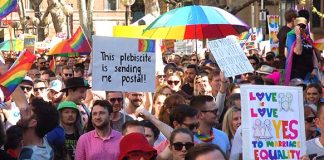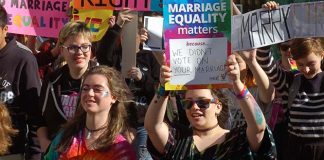The ACT has become the first state or territory in Australia to recognise same-sex marriage, in a move that increases the pressure on Tony Abbott and is an important blow against homophobia. Darlene Cox, who is making plans to marry her partner in the ACT, told ABC, “It’s fantastic, it feels great. This is about enhancing my rights.”
The Marriage Equality (Same Sex) Act 2013 allows two adults of the same sex, who cannot marry under the Commonwealth Marriage Act 1961, to enter into a formally recognised marriage. Similar legislation is also being put forward in NSW and Tasmania.

In 2004 the Coalition government’s Marriage Amendment Bill reaffirmed marriage as a “union between a man and woman, to the exclusion of all others … for life.” This federal ban on same-sex marriage has fostered and legitimised homophobia in Australia. In 2012, laws to legalise same-sex marriage failed to pass in federal parliament, with Labor granting its members a conscience vote and the Coalition voting against.
The ACT legislation, like the bills in NSW and Tasmania, is designed to create a separate category of marriage, so that it does not explicitly conflict with the Federal Marriage Act. It will be up to the High Court to decide whether this is constitutionally valid.
There has been some concern that the ACT law may exclude some transgender and intersex people from getting married, since couples would have to identify as either male or female to apply. Creating two separate types of marriage also means a person’s marriage would no longer be valid if they changed gender. But it is clear that whatever problems it may have the move is a step forward.
The laws, though, are not safe. The Coalition government has instigated a High Court challenge to overturn the legislation with a hearing set for 3 and 4 December. Couples are only able to marry from the 7 December in the ACT.
This is clearly a sign of the government’s homophobia. But publicly Abbott has simply justified the challenge as necessary to ensure ACT law is consistent with federal law, namely the Marriage Act and the Family Law Act.
“It’s not a question of being for or against gay marriage,” Abbott said. “It’s a question of adhering to the Constitution.”
This is a far cry from what Abbott has said in the past and shows the Coalition is on the backfoot. There is wide support in the community for equal marriage, and the Coalition does not have the confidence to be openly homophobic. Protests can put pressure on the High Court and the NSW parliament to support same-sex marriage and further embarrass the Liberals.
By Marijke Hoving





